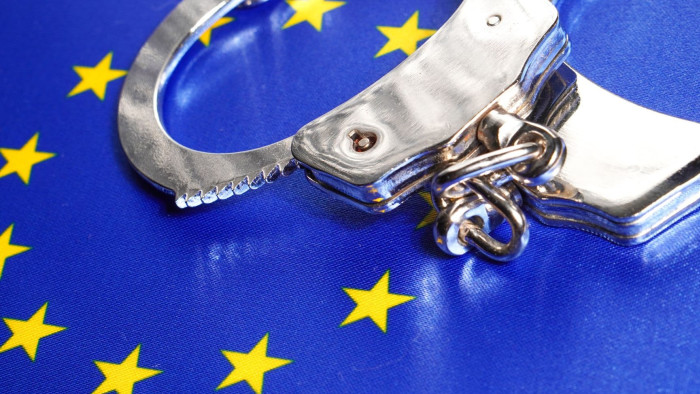
On 18 February, Fair Trials brought together criminal justice professionals to discuss barriers to the use of alternatives to the European Arrest Warrant. In this blog, we explain why we are calling on the European Commission to adopt a legal obligation for the authorities of Member States to conduct a proportionality assessment and consider the alternatives to the EAW. [1]
The EAW enables investigative authorities to bring a suspect in front of them within a matter of weeks, with minimum paperwork. While this benefits the authorities, it can have a devastating impact on someone who is subject to an EAW, as it involves being deported to a country where they may not speak the language or have any support. In addition, the EAW typically involves pre-trial detention, even though the suspect has not yet having been convicted. This happens in a context of alarming prison overcrowding across Europe, of which people held in pre-trial detention constitute over 20% on average. Overcrowding often leads to worsening prison conditions, threatening mutual trust and the functioning and legality of mutual recognition instruments like the EAW. [2] The absence of common EU standards on pre-trial detention means that there is no EU oversight over these trends.
After the adoption of the EAW, the EU enacted alternative measures that could be used by authorities in cross-border proceedings to avoid recourse to detention. These instruments support judicial cooperation in the fight against serious cross-border crimes, while also help protecting people s rights, the presumption of innocence and the need for social rehabilitation. Nevertheless, they are not being sufficiently used, while the number of EAWs continues to grow.
Why not? There are multiple, complex reasons for this. One key, objective factor is the fact that the EAW legislation does not make it compulsory for judicial authorities to conduct a proportionality assessment and as part of that, consider whether alternative, less restrictive measures would meet the needs of the investigating authorities (typically, for the person to be present at trial). It is all too easy to resort to the EAW, and it is all too often that authorities resort to detention when a person is living abroad or has a foreign citizenship for authorities, this immediately gives rise to a suspicion that there is a risk that the person will evade justice and not appear for trial. So, put simply, in our common European space, where people can circulate freely – the exercise of their right to do so will put them at a disadvantage, at the risk of detention with life-changing consequence, as compared to people who are living in their country of citizenship.
Our justice systems are required to protect our fundamental rights, including our right to liberty and presumption of innocence, and can only restrict our freedoms where there is no other option. This requires careful analysis on a case-by-case basis. This requires a proportionality assessment, namely that the means employed should be reasonably proportionate to the legitimate aim pursued. In other words, when deciding upon whether to issue an EAW, judicial authorities must be required to assess the proportionality of issuing an EAW and consider whether alternative measures are available or if any measure at all is necessary at all as in many cases, the person will be willing to cooperate freely.
The case law of the Court of Justice of the EU (CJEU) has sought to fill this gap, recognising the obligation to conduct a proportionality assessment. In a ruling of 28 January 2021, the CJEU stated that the protection of the rights of the person concerned by an EAW requires, inter alia, that the issuing judicial authority review observance of the conditions to be met when issuing a European arrest warrant and examine objectively taking into account all incriminatory and exculpatory evidence, without being exposed to the risk of being subject to external instructions, in particular from the executive whether it is proportionate to issue that warrant. [4]
Austria is an example of good practice on this matter, at least on a theoretical level. As shown in case C489/19 PPU, Austrian law requires a court reviewing EAWs issued by the Public Prosecutor s Offices of Austria to conduct a proportionality assessment when deciding whether to endorse the EAW or not. As explained in paragraph 44 of the judgment, the domestic court is required to consider the effect of the surrender and transfer on the social and family relationships of the person living in a Member State other than Austria. While such legislation is welcomed, and should be widely promoted, the question remains whether such proportionality assessments are conducted in practice.
With the adoption of the alternative measures, the EU has recognised the need for a more nuanced approach to issuing restrictive measures and for the need to consider fundamental rights issues. What practice has shown, however, is that nuance is lacking, and further action needs to be taken on both domestic and EU level. It is time for a proportionality assessment to be made compulsory when issuing an EAW. It is time for judicial authorities to engage with the alternative instruments that they have at their disposal. We need to trust our justice system to effectively protect our rights and freedoms.
Read more about our work on cross-border judicial cooperation.
Read more about extradition reform.
Footnotes
[1] European Supervision Order, European Investigation Order, European Probation Order, Framework Decision on Transfer of Prisoners.
[2] See for instance Varga and Others v. Hungary, App. No. 14097/12 and 4 others, 10 March 2015 and J.M.B. and Others v. France, App. No. 9671/15 and 31 others, 30 January 2020.
[3] See Recital 22 of Directive 2016/343.
[4] Case C-649/10, IR, 28 January 2021, paragraph 75, citing previous cases (Judgment of 12 December 2019, Parquet général du Grand-Duché de Luxembourg and Openbaar Ministerie (Public Prosecutors of Lyons and Tours), C‚Äë566/19 PPU and C‚Äë626/19 PPU, EU:C:2019:1077, paragraph 61 and the case-law cited).


